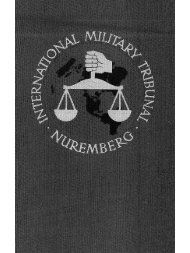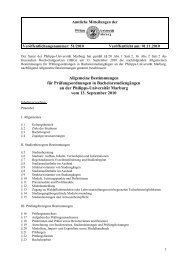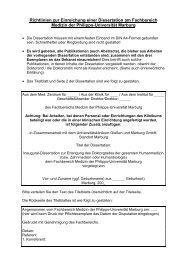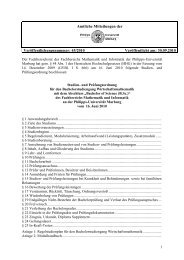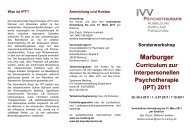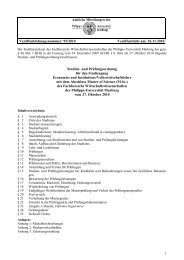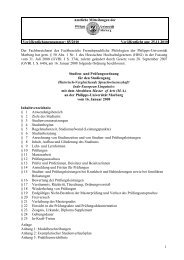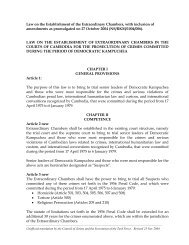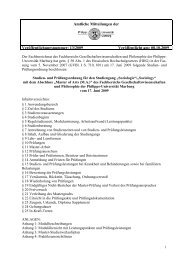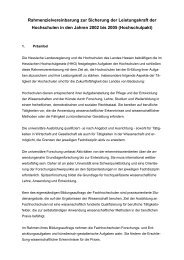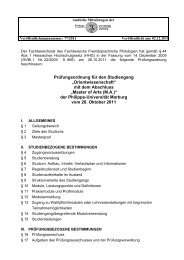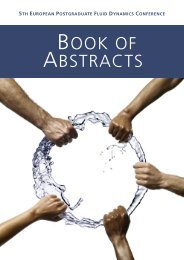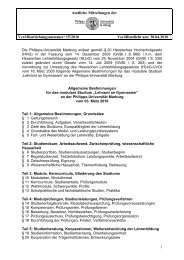Peace and Conflict Studies - uni-marburg
Peace and Conflict Studies - uni-marburg
Peace and Conflict Studies - uni-marburg
You also want an ePaper? Increase the reach of your titles
YUMPU automatically turns print PDFs into web optimized ePapers that Google loves.
Lehr- und Lernformen, Veranstaltungstypen<br />
international relations.<br />
These specific learning outcomes contribute to achieving the learning<br />
outcomes of our taught postgraduate Masters level programmes. Students<br />
successfully completing Masters level programmes in the School<br />
of Politics <strong>and</strong> International Relations will be able to:<br />
- demonstrate specialised knowledge of, <strong>and</strong> critical insight into, the key<br />
historical <strong>and</strong> theoretical issues in their programme area, together with<br />
familiarity with appropriate bibliographical sources<br />
- apply theoretical <strong>and</strong> conceptual frameworks to the analysis of politics<br />
<strong>and</strong> international relations.<br />
- use a variety of research methods <strong>and</strong> evaluate critically their application<br />
in the scholarly literature.<br />
- conduct research in politics <strong>and</strong> international relations demonstrating<br />
awareness of epistemological, methodological <strong>and</strong> ethical principles.<br />
The intended generic learning outcomes <strong>and</strong>, as appropriate, their relationship<br />
to programme learning outcomes<br />
Students who successfully complete this module<br />
- GLO1: will be able to work with theoretical knowledge at the forefront<br />
of their discipline.<br />
- GLO2: will be aware of the ethical dimensions of the scholarly work<br />
done in their discipline in general as well as of their own work in particular.<br />
- GLO3: will have a comprehensive underst<strong>and</strong>ing of methods <strong>and</strong><br />
methodologies in their discipline<br />
- GLO4: will be able to undertake analysis of complex, incomplete or<br />
contradictory area of knowledge.<br />
- GLO5: will have a level of conceptual underst<strong>and</strong>ing that will allow<br />
them to critically evaluate research, advanced scholarship <strong>and</strong> methodologies<br />
<strong>and</strong> argue alternative approaches.<br />
- GLO6: will be reflective <strong>and</strong> self-critical in their research work.<br />
- GLO7: will be able to engage in academic <strong>and</strong> professional comm<strong>uni</strong>cation<br />
with others.<br />
- GLO8: will have independent learning ability required for continuing<br />
professional study.<br />
By helping students to progress towards these generic learning outcomes,<br />
the module contributes to achieving the general aims of our<br />
taught postgraduate Masters level programmes which aim to<br />
- provide students with an advanced training in their disciplines.<br />
- develop the students’ transferable skills emphasising research skills,<br />
analytical <strong>and</strong> conceptual skills, independent work <strong>and</strong> self-organisation.<br />
Vorlesung und Seminar<br />
Lectures will aim at introducing key theoretical <strong>and</strong> practical issues concerning<br />
human rights <strong>and</strong> international relations. Achievement of learning<br />
outcomes: these outcomes will be achieved through the oral <strong>and</strong><br />
visual presentation of lecture material that will synthetically introduce<br />
the relevant issues, present key positions, ask questions, <strong>and</strong> provide<br />
examples pertaining to human rights <strong>and</strong> international relations. Seminars<br />
will be based on discussions of the topics introduced in the lectures<br />
<strong>and</strong> the reading done independently by students. Discussions will be<br />
introduced by a presentation given by a student.<br />
Learning outcomes: SLO1-SLO8, GLO1-GLO8; in particular, gain<br />
comprehensive underst<strong>and</strong>ing by linking lectures, independent reading<br />
<strong>and</strong> class discussion; apply concepts <strong>and</strong> theories to empirical questions;<br />
structure <strong>and</strong> defend complex arguments through presentations <strong>and</strong> dis-<br />
38



